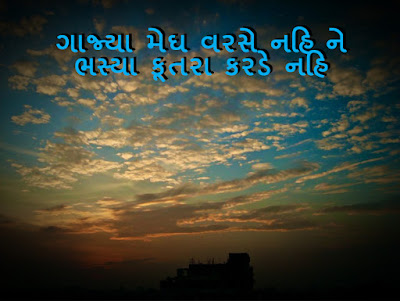કહેવત
(Kahevat)
સોનીના સો ઘા તો લુહારનો એક ઘા
(Transliteration: Sonina sau gha to luhaarno ek gha)
सौ सुनार की, एक लौहार की
(Transliteration: Sau sonar ki ek lauhar ki)
Meaning: Hundred blows of a goldsmith is comparable with one blow of an ironsmith.
(Literally speaking, this proverb in Gujarati and Hindi means one powerful blow is comparable with a hundred smaller blows, or that one knockout is better than a hundred punches)
કહેવત
(Kahevat)
એક કાંકરે બે પક્ષી મારવા
(Transliteration: Ek kaankre be pakshi maarva)
एक पंथ दो काज
(Transliteration: Ek panth do kaaj)
Meaning: Kill two birds with one stone, achieve two aims at once.
(Literally speaking, this proverb in Gujarati means the same thing as above)
કહેવત
(Kahevat)
ઉંદર બિલાડીની રમત
(Transliteration: Undar biladi ni ramat)
चूहे बिल्ली का खेल
(Transliteration: Chuhe billi ka khel)
Meaning: Play cat and mouse, an action involving constant pursuit, near captures and repeated escapes.
(Literally speaking, this proverb in Gujarati means the same thing as above)
કહેવત
(Kahevat)
જેટલા મોં તેટલી વાતો
(Transliteration: Jetla moh tetli vaato)
जितने मुँह उतनी बातें
(Transliteration: Jitne muh utni baatein)
Meaning: People will always talk, we shouldn't pay heed to them.
(Literally speaking, this proverb in Gujarati and Hindi means the more the mouths (of people), the more they will talk (gossip), so one must not worry about what everyone else will think)
કહેવત
(Kahevat)
ગાજ્યા મેઘ વરસે નહિ ને ભસ્યા કૂતરા કરડે નહિ
(Transliteration: Gaajya megh varse nahi ne bhasya kutra karde nahi)
Meaning: Barking dogs seldom bite.
(Literally speaking, this proverb in Gujarati means clouds that thunder do not pour and dogs that bark do not bite)
કહેવત
(Kahevat)
ગરજે ગધેડાને પણ બાપ કહેવો પડે
(Transliteration: Garje gadheda ne pan baap kehvo pade)
Meaning: One who cannot be cured must be endured.
(Literally speaking, this proverb in Gujarati means in desperate times of need, one has to call a donkey his father. So desperate times call for desperate measures.)
કહેવત
(Kahevat)
સેવા કરે તેને મેવા મળે
(Transliteration: Seva kare tene meva made)
Meaning: No pain no gain.
(Literally speaking, this proverb in Gujarati means the one who works gets the sweets)
કહેવત
(Kahevat)
ચાદર જોઈને પગ પહોળા કરાય
(Transliteration: Chadar joyi ne pag paudha karaay)
Meaning: One should limit their spendings to their earnings.
(Literally speaking, this proverb in Gujarati means one should stretch their legs according to the length of the blanket)
કહેવત
(Kahevat)
ખેલ ખતમ, પૈસા હજમ
(Transliteration: Khel khatam paisa hajam)
Meaning: Getting your money's worth.
(Literally speaking, this proverb in Gujarati means the money spent on a game is digested (worth it) at the end of the game)
કહેવત
(Kahevat)
ક્યાં રાજા ભોજ અને ક્યાં ગાંગો તેલી?
(Transliteration: Kya Raja Bhoj ane kya Gangu Teli)
Meaning: Huge contrast between something important (e.g. a king) and something inconsequential (e.g. oil-presser).
(Literally speaking, this proverb in Gujarati means King Bhoj and Gangu Teli (Oil-presser) are miles apart. So there can be no comparison between two very different things of very different importance levels)
કહેવત
(Kahevat)
કાખમાં છોકરું ને ગામમાં ઢંઢેરો
(Transliteration: Kaakh ma chokru ne gaam ma dhindhero)
Meaning: Searching frantically for something right under your nose.
(Literally speaking, this proverb in Gujarati means alerting the whole town in search of your boy when he is actually right under your arm)
કહેવત
(Kahevat)
આફતનું પડીકું
(Transliteration: Aafat nu padiku)
Meaning: Bundle of trouble.
(Literally speaking, this proverb in Gujarati means the same as above.)
કહેવત
(Kahevat)
અધૂરો ઘડો છલકાય ઘણો
(Transliteration: Adhuro gahdo chalkaay ghano)
Meaning: Empty vessels make the most noise.
(Literally speaking, this proverb in Gujarati means a half-filled pot splashes a lot (and also makes more noise). It is referred to a person who has less knowledge but shows off more)
કહેવત
(Kahevat)
પારકી આશ સદા નિરાશ
(Parki aash sada niraash)
Meaning: The best way to avoid disappointment is to not expect anything from anyone.
(Literally speaking, this proverb in Gujarati means expecting anything from anyone will always disappoint you. So one should do everything themselves, rather than depending on anyone else.)
કહેવત
(Kahevat)
રાત ગઈ અને વાત ગઈ
(Raat gayi ane vaat gayi)
Meaning: Let bygones be bygones, forget past differences and reconcile.
(Literally speaking, this proverb in Gujarati means the talk/argument ended with the night, the next day is a new day for new beginnings.)
કહેવત
(Kahevat)
દીવા તળે અંધારું
(Deeva tade andharu)
Meaning: Darkness under the light.
(Literally speaking, this proverb in Gujarati means darkness under the earthen lamp.)
કહેવત
(Kahevat)
જેવો દેશ તેવો વેશ
(Jevo desh tevo vesh)
Meaning: When in Rome, do as the Romans do.
(Literally speaking, this proverb in Gujarati means it is polite to abide by the customs of a country when one is a visitor.)
કહેવત
(Kahevat)
જાતે પગ પર કુલ્હાડો મારવો
(Jaate pag par kulhado maarvo)
Meaning: Cutting the branch on which you are sitting.
(Literally speaking, this proverb in Gujarati means to hit one's own foot with an axe, much like digging your own grave.)

















